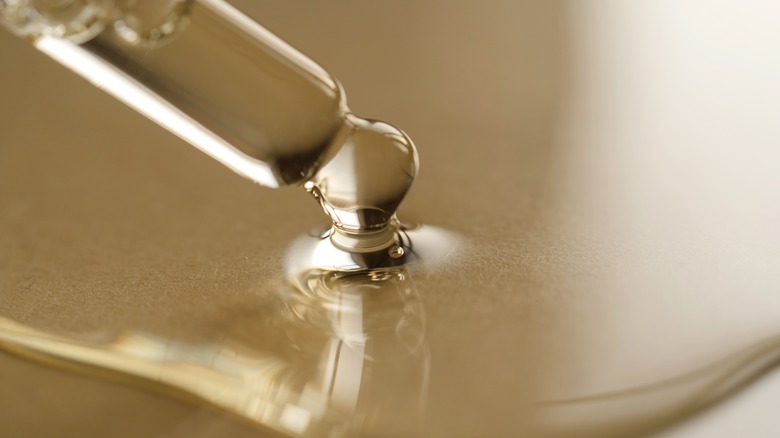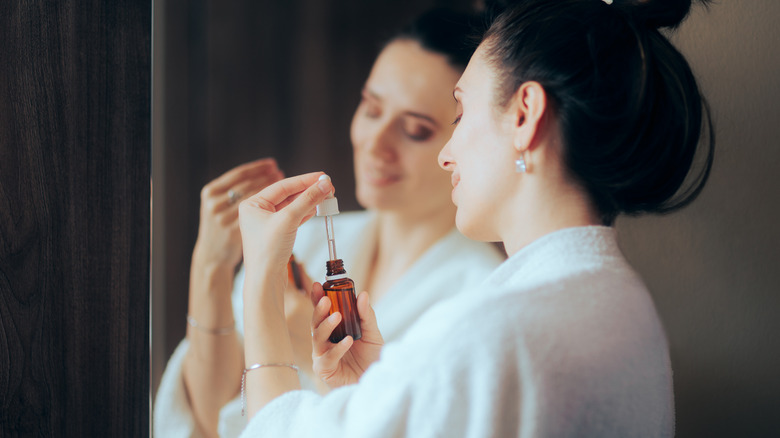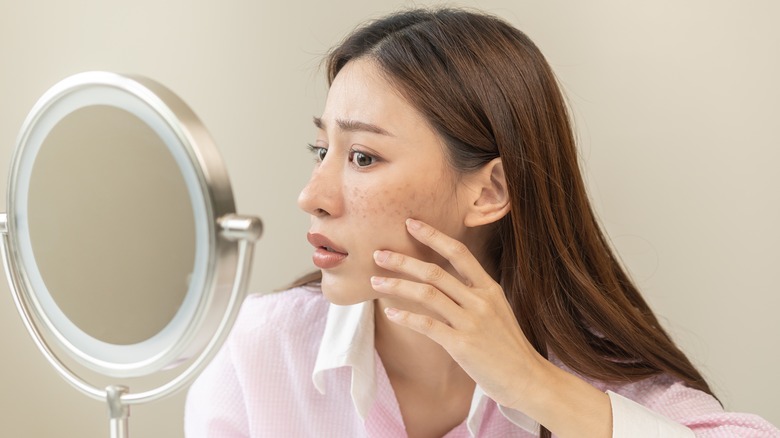What Really Happens To Your Skin If You Quit Using Retinol
We may receive a commission on purchases made from links.
Retinol has long been considered the darling of the skin care industry, thanks to the litany of benefits it's able to deliver. To the uninitiated, retinol is an ingredient derived from vitamin A. Professionals and consumers alike have raved about the wonders it can do for the skin, including reversing the signs of aging, bringing out your inner glow, and facilitating rapid skin cell production.
"Found mostly in animal foods like whole milk, oily fish, and liver, retinol helps your body form and maintain healthy skin, plays a role in regulating the immune system, and can even protect against infection," registered dietitian Stefani Sassos explained to Good Housekeeping. When it comes to skincare, however, retinol is a milder variety of tretinoin or retinoic acid, making it widely accessible to consumers. Many products in the market have retinol as a hero ingredient, and per dermatologist Francesca Fusco, MD, it's considered the "gold standard" thanks to its ability to "sweep away dead skin cells, clogged pores, and dull skin" (via Vogue).
Those who wish to maintain a healthy complexion are encouraged to include retinol in their respective regimens, but the frequency with which you apply it should be increased gradually. Dr. Joshua Zeichner, MD, the director of cosmetic and clinical research at Mount Sinai, told Healthline to use it sparingly at first. You may move on to using retinol every night if you don't experience any side effects. But if you decide to stop your usage for any reason, you should also prepare for the consequences.
You may still enjoy benefits even after pausing retinol use
If you want to overhaul your skincare routine and step back from using products, including retinol, for a short while, studies show that you may still reap the ingredient's benefits. As pointed out by Skin Type Solutions, a study published in the Journal of the American Academy of Dermatology revealed that the residual benefits of retinoids last up to two months after stopping use. In short, just because you decided to halt your retinol usage temporarily, it doesn't mean that your skin will return to the way it was right away.
Then again, it's worth noting that you'll only get to enjoy retinol's full strength if you apply it regularly. Dermstore explained that since the ingredient facilitates skin cell turnover, hitting pause for a long amount of time is akin to starting from scratch. If you're really keen on stopping retinol use indefinitely, you must be patient enough to kickstart the process to build your tolerance once you decide to use it again.
When to stop using retinol
Retinol may have a long list of skincare benefits, but it's still not for everyone. Experts always warn about the potential redness and dryness you may experience during the first few uses. However, if you notice that your reaction to the ingredient is more intense, it's advised that you stop using it immediately and consult a dermatologist for the best course of action.
"If your face starts to look like a charred tomato, it's time to back off and see a physician," Beverly Hills dermatologist Ava Dr. Shamban shared with Self. Meanwhile, dermatologist Dr. Michele Green listed the signs to look out for, which include cracking of the skin, open lesions, and the development of a rash. When the latter happens, it may mean that you're allergic.
There's also a retinol myth that consistent use can inflict damage or cause skin thinning, but you must pay it no mind, says Dr. Devika Icecreamwala, founder of the Icecreamwala Dermatology. The myth only stemmed from people who overused retinol, as it turns out. "If you're using a retinol that's too strong for you, it can lead to peeling, irritation, and excessive dryness, which may have led to retinol's association with skin thinning," she explained (via InStyle). The only other time your skin will thin is if you don't use SPF. With that being said, make sure to apply sunscreen liberally to shield your skin from the harsh rays of the sun.


